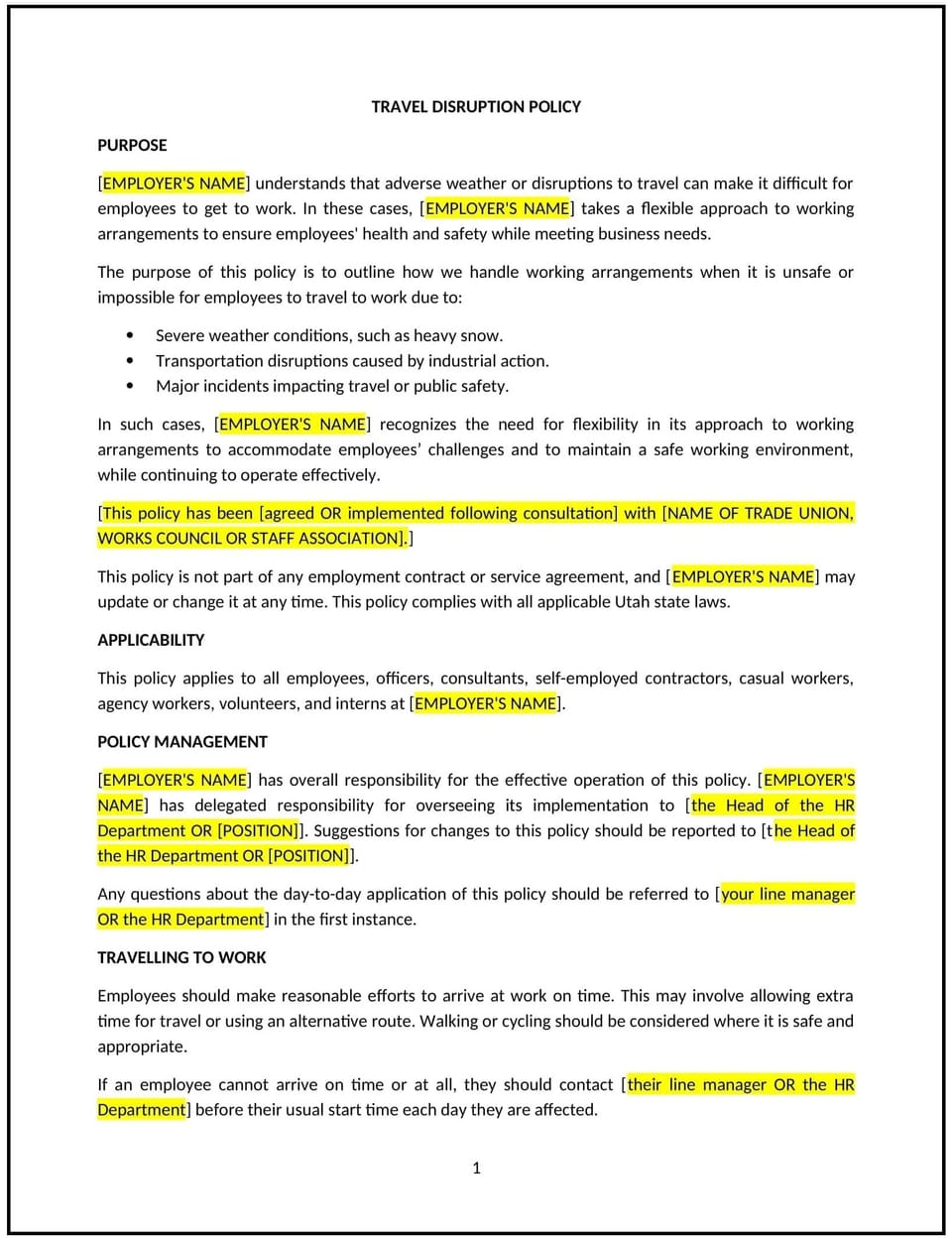Travel disruption policy (Utah): Free template

Travel disruption policy (Utah)
This travel disruption policy is designed to help Utah businesses establish guidelines for managing employee travel disruptions, such as flight cancellations, natural disasters, or medical emergencies. It outlines procedures for rebooking, accommodations, and communication during disruptions.
By adopting this policy, businesses can support employees during travel disruptions, minimize operational impacts, and align with general best practices for travel management.
How to use this travel disruption policy (Utah)
- Define travel disruptions: Specify what constitutes a travel disruption, such as flight cancellations, severe weather, or medical emergencies.
- Establish rebooking procedures: Provide steps for employees to rebook travel arrangements during disruptions.
- Address accommodations: Specify whether the business will cover additional accommodation costs during extended disruptions.
- Ensure communication: Outline how employees should communicate with the business during travel disruptions.
- Train employees: Educate employees on the policy and their responsibilities during travel disruptions.
- Monitor compliance: Regularly review travel arrangements to ensure adherence to the policy.
- Review and update: Assess the policy annually to ensure it aligns with evolving travel risks and business needs.
Benefits of using this travel disruption policy (Utah)
This policy offers several advantages for Utah businesses:
- Supports employees: Demonstrates a commitment to helping employees navigate travel disruptions.
- Minimizes operational impacts: Ensures business operations can continue smoothly despite travel disruptions.
- Aligns with best practices: Offers a structured approach to managing travel disruptions.
- Reduces stress: Provides employees with clear guidelines and support during unexpected travel issues.
- Builds trust: Shows employees that the business values their safety and well-being.
Tips for using this travel disruption policy (Utah)
- Communicate the policy: Share the policy with employees and include it in the employee handbook.
- Provide training: Educate employees on the policy and their responsibilities during travel disruptions.
- Monitor compliance: Regularly review travel arrangements to ensure adherence to the policy.
- Address issues promptly: Take corrective action if travel disruptions are mishandled or cause operational delays.
- Update regularly: Assess the policy annually to ensure it aligns with evolving travel risks and business needs.
Q: How does this policy benefit businesses?
A: By managing travel disruptions effectively, businesses can support employees, minimize operational impacts, and reduce stress.
Q: What types of travel disruptions are typically covered?
A: Covered disruptions may include flight cancellations, severe weather, natural disasters, or medical emergencies.
Q: How can businesses ensure employees follow the policy during disruptions?
A: Businesses should provide clear guidelines, maintain open communication, and offer support during disruptions.
Q: What should businesses do if a travel disruption causes significant delays?
A: Businesses should assist employees with rebooking, cover additional costs if necessary, and adjust workflow as needed.
Q: How often should businesses review this policy?
A: Businesses should review the policy annually or as needed to ensure it aligns with evolving travel risks and business needs.
This article contains general legal information and does not contain legal advice. Cobrief is not a law firm or a substitute for an attorney or law firm. The law is complex and changes often. For legal advice, please ask a lawyer.


